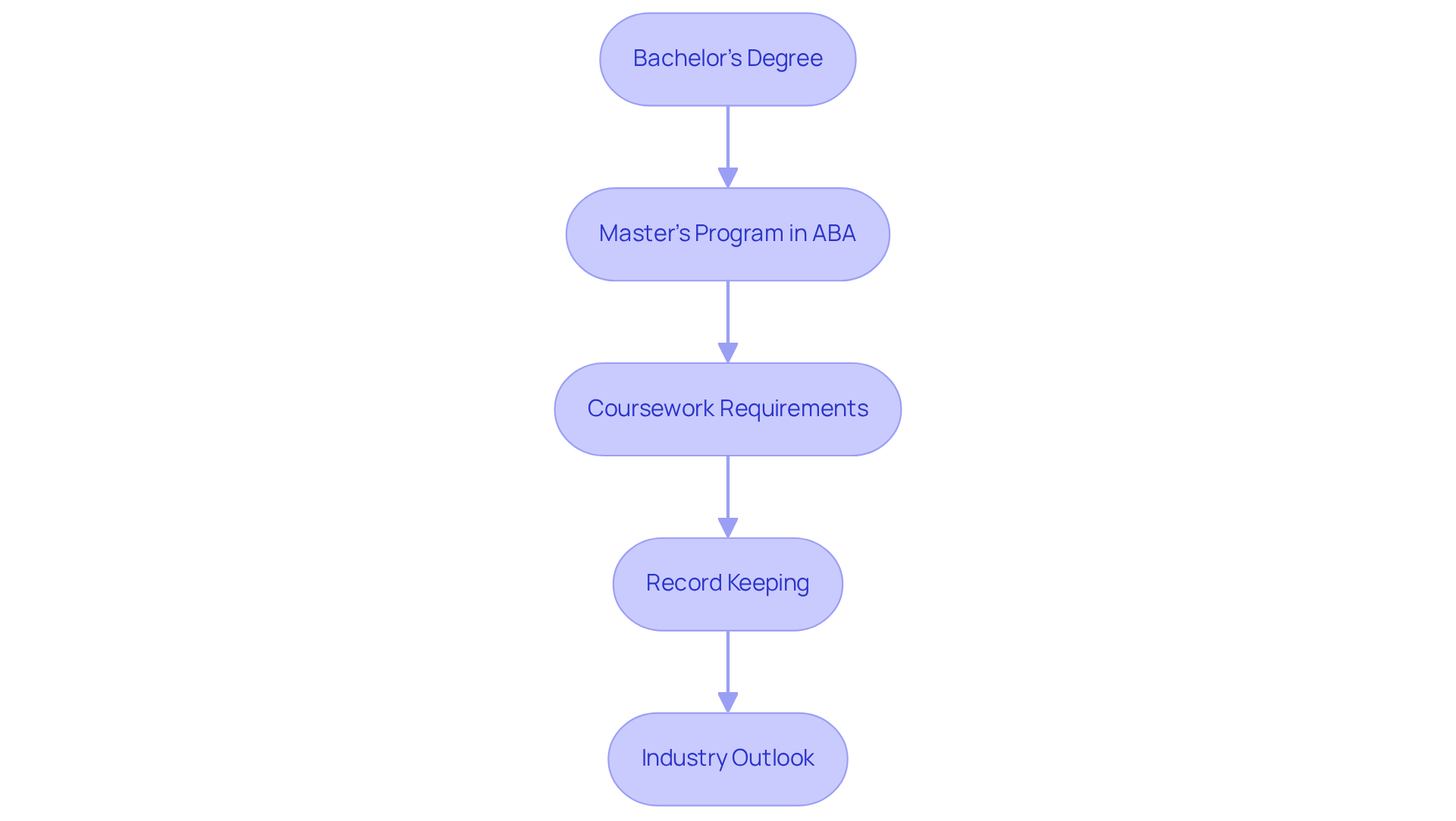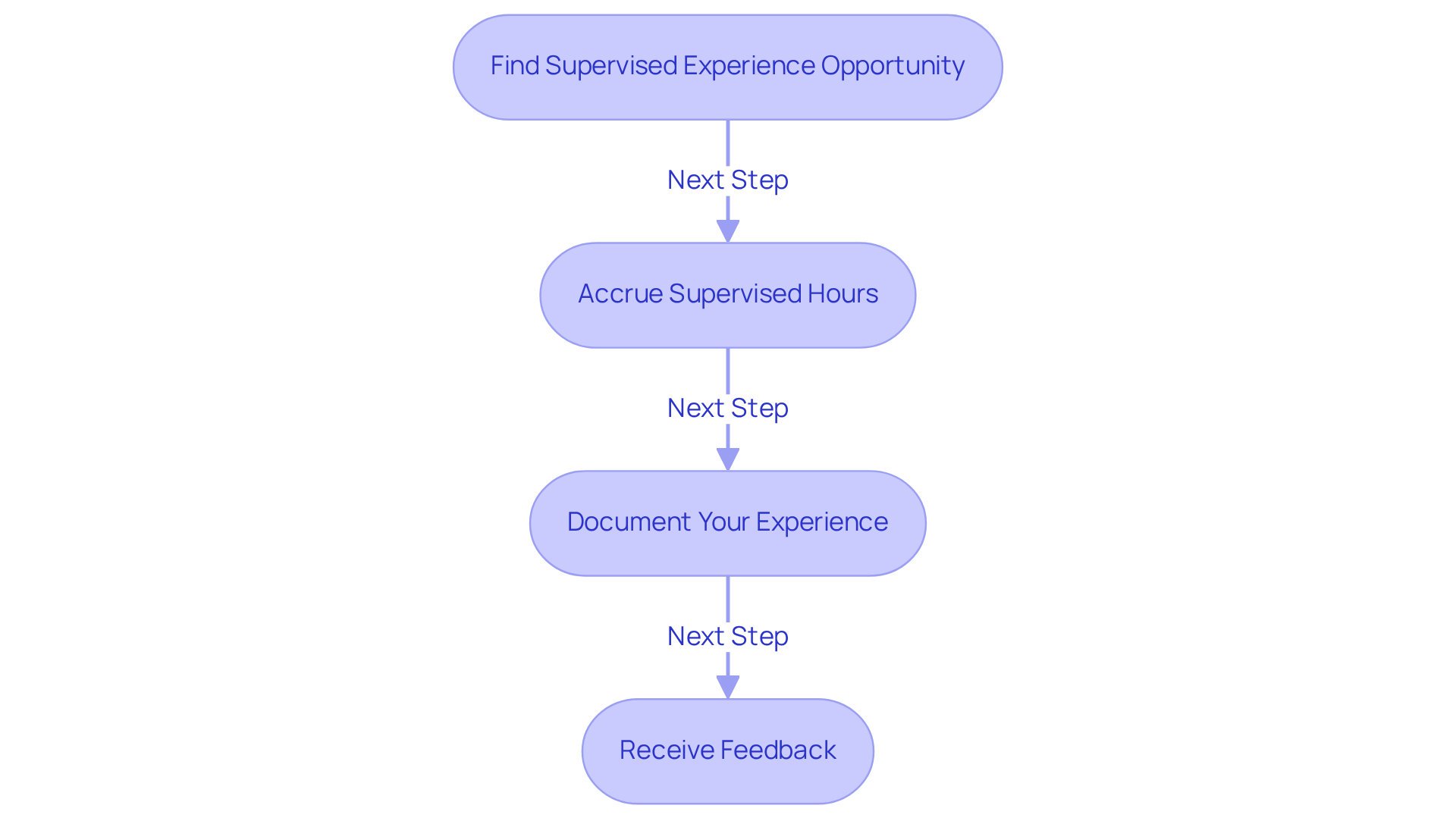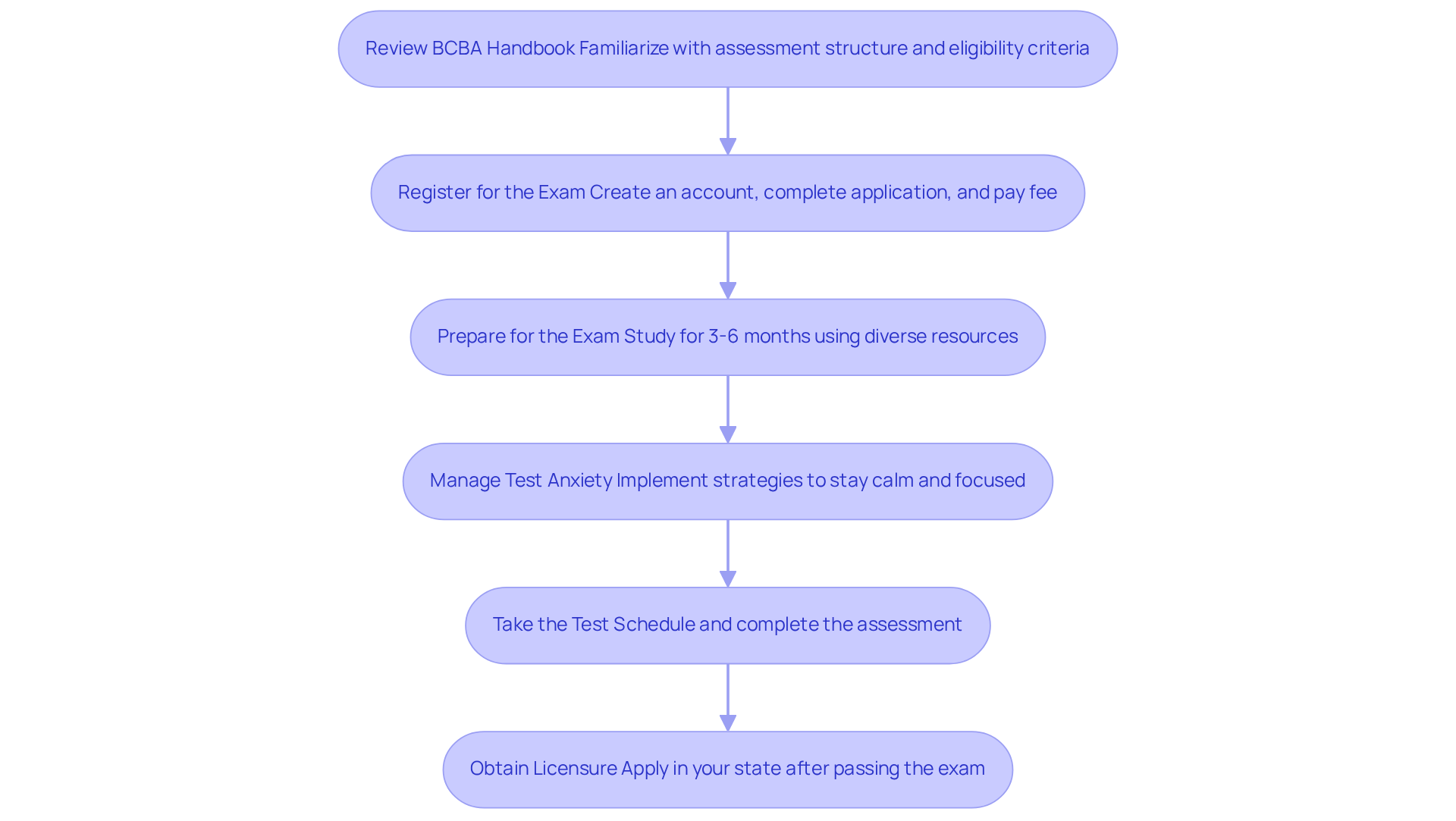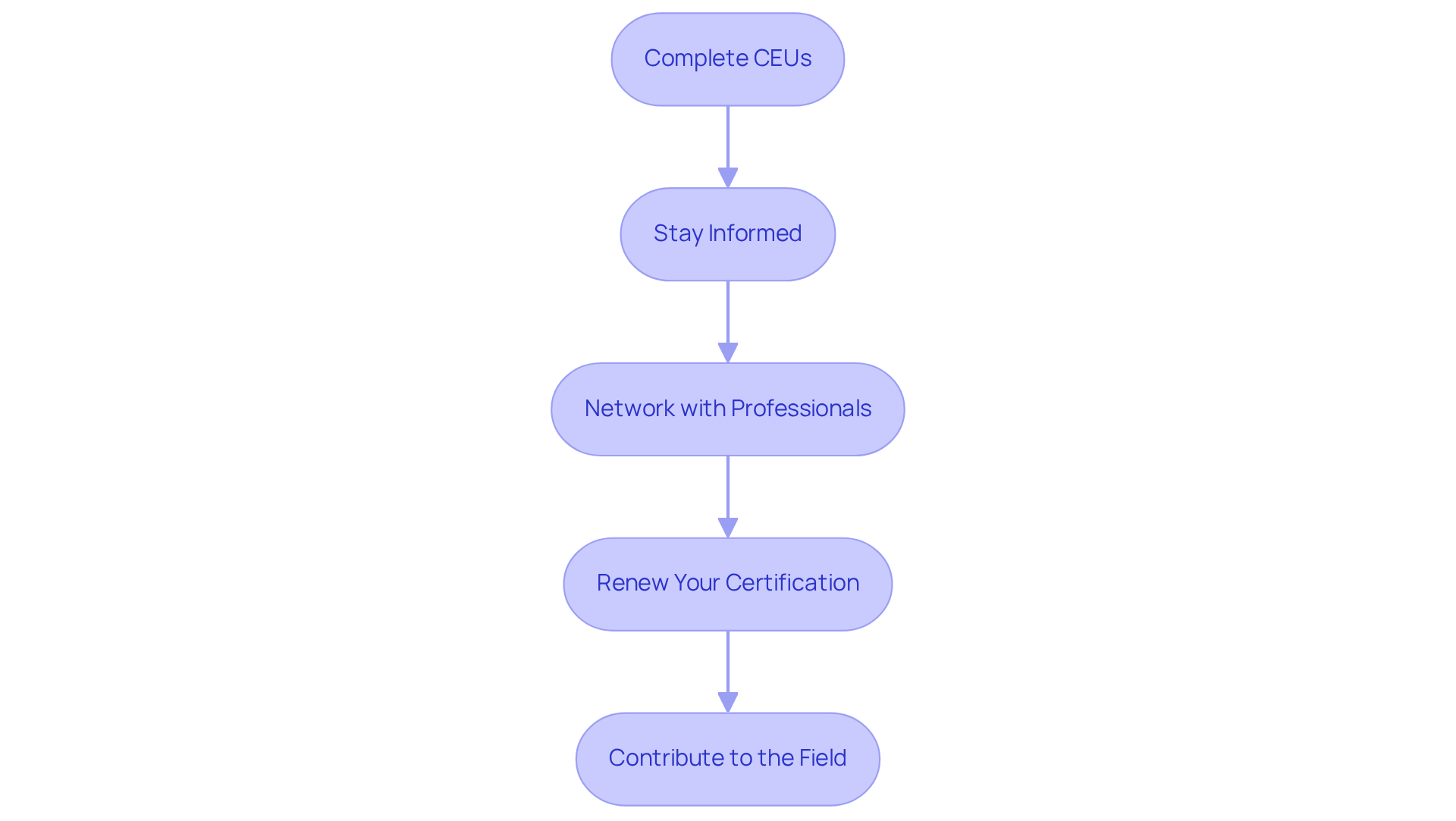Overview
To become a licensed behavior analyst, one must complete essential educational qualifications, gain relevant field experience, pass the BCBA examination, and maintain certification through ongoing professional development. Did you know that the demand for Board Certified Behavior Analysts (BCBAs) is on the rise? This increasing need underscores the importance of accredited education and supervised practice. The steps to achieving this esteemed certification are crucial for ensuring competency and ethical standards in the field.
- First, it is imperative to pursue an accredited educational program that provides the foundational knowledge necessary for effective practice.
- Following this, gaining relevant field experience under supervision is vital, as it allows aspiring BCBAs to apply their learning in real-world settings.
- Next, thorough exam preparation cannot be overstated; it is essential to pass the BCBA examination, a significant milestone in one’s career.
- Finally, maintaining certification through ongoing professional development is not just a requirement but a commitment to continuous learning.
This dedication ensures that BCBAs remain at the forefront of best practices and ethical standards. By understanding and following these steps, you position yourself for success in this rewarding field. Are you ready to take the next step towards becoming a licensed behavior analyst?
Introduction
The journey to becoming a licensed behavior analyst is marked by significant educational milestones, practical experience, and rigorous certification. With the demand for qualified professionals in Applied Behavior Analysis (ABA) surging, understanding the essential steps to achieve this credential is increasingly vital.
What challenges might aspiring analysts face on this path? How can they effectively navigate the complexities of certification, field experience, and ongoing professional development?
This guide delves into the crucial steps required to embark on a rewarding career as a licensed behavior analyst, equipping readers with the insights needed to succeed in this impactful field.
Complete Required Educational Qualifications
To become a licensed behavior analyst, you must complete specific educational qualifications, which typically involve the following steps:
- Start with a bachelor's degree in psychology, education, or a related field. Ensure that your program includes coursework pertinent to behavioral analysis, as nearly 50% of ABA therapists possess a bachelor's degree.
- Next, enroll in a master's program specifically in Applied Behavior Analysis (ABA) or a related field. This program should be accredited and include the required coursework as outlined by the Behavior Analyst Certification Board (BACB). The demand for accredited master's programs is increasing, reflecting the growing recognition of the licensed behavior analyst credential.
- Your master's program must cover , including ethics, research methods, and behavior assessment techniques. Confirm that your program satisfies BACB's Verified Course Sequence (VCS) criteria, as this is essential for eligibility.
- Maintain detailed records of your coursework and degrees, as you will need to submit these when applying for certification. This documentation is essential, particularly given that the average duration to obtain a behavior analyst credential is roughly two to four years, based on the speed of finishing your graduate degree and necessary field experience.
- As of 2023, the landscape of ABA education is evolving, with a notable increase in job postings for licensed behavior analysts, indicating a robust demand for qualified professionals in the field. The typical salary for a Board Certified Behavior Analyst in the United States is $68,000 annually, and the Behavior Analyst Certification Board indicates that the count of newly certified professionals has risen by an average of 14% each year since 2010. Furthermore, over 80% of ABA therapists report that their clients make progress in treatment, underscoring the rewarding nature of this career.

Gain Relevant Field Experience
Gaining relevant field experience is an essential step following the completion of your educational qualifications. This process encompasses several key components:
- Finding a Supervised Experience Opportunity: It is vital to seek positions that allow you to work under a qualified BCBA. Opportunities can be found in various environments, such as schools, clinics, and private practices, where you can apply principles of behavior analysis in real-world situations.
- Accruing Supervised Hours: You are required to complete a total of , with a minimum of 60% of these hours dedicated to unrestricted activities that focus on developing competencies in behavior analysis. Restricted activities, which involve direct client interaction, may account for no more than 40% of your total fieldwork hours. This structure ensures you gain a comprehensive understanding of the role, preparing you for independent practice. Additionally, you must conduct one observation with a client each month to accumulate hours.
- Documenting Your Experience: It is crucial to maintain a detailed log of your hours and the specific activities in which you participated. Accurate documentation is essential, as it will be necessary when pursuing certification. The BACB recommends keeping records for at least seven years to ensure compliance during audits.
- Receiving Feedback: Regular meetings with your supervisor are important for discussing your progress and obtaining constructive feedback. This ongoing dialogue is vital for refining your skills and preparing effectively for the qualification exam. Engaging in reflective practice will enhance your learning and professional development, ultimately leading to successful certification as a behavior analyst. Notably, 90% of individuals experience significant progress when the recommended hours are fully implemented with active caregiver participation.

Pass the BCBA Examination and Obtain Licensure
Successfully passing the behavior analyst certification examination is a crucial step in becoming a licensed behavior analyst. The demand for licensed behavior analysts is increasing, making this certification more important than ever. Here’s how to effectively prepare:
- Review the BCBA Handbook: Begin by familiarizing yourself with the assessment structure, content sections, and eligibility criteria outlined in the BCBA Handbook available on the BACB website. Understanding the framework of the assessment is essential, particularly with the recent shift to the 6th Edition Test Content Outline, which introduces new terminology and cultural considerations.
- Register for the Exam: Create an account on the BACB website, complete the application process, and pay the examination fee. Ensure you meet all eligibility criteria, including the completion of required coursework and supervised fieldwork hours, before applying.
- Prepare for the Exam: Effective preparation typically requires three to six months of dedicated study. Utilize a range of study resources, engage in for collaborative learning, and complete practice assessments to reinforce your understanding of essential concepts. Focus particularly on areas where you feel less confident; this targeted approach can significantly enhance your readiness. Many successful applicants suggest developing a structured study strategy that incorporates regular review sessions and practice tests to increase familiarity with the test format. Incorporating the five elements of an effective study plan—setting realistic goals, creating a structured schedule, utilizing diverse study materials, joining study groups, and practicing with timed exams—can further bolster your preparation.
- Manage Test Anxiety: Candidates often experience anxiety leading up to the assessment. To mitigate this, consider implementing strategies such as setting realistic goals, taking breaks, seeking support, maintaining a positive outlook, practicing self-care, and asking for help. These methods can assist you in maintaining a calm and focused mindset on test day.
- Take the Test: Schedule your assessment through Pearson VUE, ensuring you arrive prepared and confident. Many applicants report that arriving early on assessment day helps reduce anxiety and provides time to relax before the test. The assessment consists of 185 multiple-choice questions, including 10 pilot questions that do not contribute to your score. A passing score, typically around 76%, will grant you BCBA certification.
- Obtain licensure to become a licensed behavior analyst by applying in your state after successfully completing the test, as requirements may vary. Check your state’s licensing board for specific instructions to ensure compliance with local regulations.
Successful BCBAs emphasize the importance of a comprehensive preparation strategy. As Dana Meller pointed out, "Comprehending the source material is essential for test day success." Another successful candidate shared, "Mock exams are a great way to build test-taking skills." By adhering to these steps and leveraging the experiences of those who have achieved success, you can navigate the journey to becoming a Board Certified Behavior Analyst with confidence.

Maintain Certification and Stay Informed
In today's competitive landscape, the demand for Board Certified Behavior Analysts (BCBAs) is on the rise, underscoring the importance of maintaining your certification. Ensuring your skills remain relevant and your practice adheres to ethical standards is not just beneficial; it's essential. Here’s how to effectively manage your professional development:
- Complete Continuing Education Units (CEUs): Every two years, BCBAs are required to complete 32 CEUs, with a minimum of 4 focused on ethics. This commitment not only keeps you informed about best practices but also strengthens your in analysis. Research indicates that the average BCBA completes approximately 20 to 30 CEUs annually, reflecting a strong commitment to ongoing education.
- Stay Informed: Are you keeping up with the latest research? Engaging with industry publications, attending conferences, and participating in workshops are crucial steps. Staying informed about advancements in the analysis of conduct is vital, particularly as the field evolves with new discoveries and techniques. Continuous learning is vital, as emphasized by Albert Einstein, who stated, "Once you stop learning, you start dying."
- Network with Professionals: Have you considered the benefits of connecting with peers? Joining professional organizations, such as the Association for Behavior Analysis International (ABAI), provides opportunities to share insights and access valuable resources that can enhance your practice. Networking can lead to collaborative opportunities that further enrich your professional development.
- Renew Your Certification: Are your records up to date? Keep meticulous records of your CEUs and ensure you submit your renewal application to the Behavior Analyst Certification Board (BACB) before your certification expires. This proactive method ensures that you remain a licensed behavior analyst and certified, prepared to deliver the highest quality of care. The influence of CEUs on your practice and ethics cannot be emphasized enough, as they guarantee that you are equipped with the latest knowledge and skills essential for effective analysis.
By prioritizing these steps, you not only fulfill the requirements for certification but also contribute to the integrity and advancement of the field of behavior analysis.

Conclusion
Becoming a licensed behavior analyst represents a structured journey that necessitates dedication, education, and practical experience. This profession not only requires a solid academic foundation but also underscores the significance of hands-on training and continuous professional development. By adhering to the essential steps outlined, individuals can adeptly navigate the path to achieving certification and licensure, ultimately making valuable contributions to the field of Applied Behavior Analysis.
The article delineates four critical steps:
- Completing the necessary educational qualifications
- Gaining relevant field experience
- Passing the BCBA examination
- Maintaining certification
Each step is meticulously designed to equip aspiring behavior analysts with the knowledge and skills essential for excelling in their careers. From obtaining a bachelor's and master's degree to accumulating supervised hours and remaining informed about industry advancements, every phase plays a pivotal role in shaping a competent professional.
As the demand for licensed behavior analysts continues to escalate, pursuing this career offers not only a rewarding professional path but also the opportunity to effect meaningful change in the lives of individuals requiring behavioral support. By committing to lifelong learning and ethical practice, future behavior analysts can ensure they remain at the forefront of their field, poised to meet the challenges of tomorrow. Embrace this journey and take the necessary steps to become a licensed behavior analyst, contributing to the positive transformation of lives through effective behavioral interventions.
Frequently Asked Questions
What are the educational qualifications required to become a licensed behavior analyst?
To become a licensed behavior analyst, you need to complete a bachelor's degree in psychology, education, or a related field, followed by a master's program in Applied Behavior Analysis (ABA) or a related field that is accredited and meets the coursework requirements set by the Behavior Analyst Certification Board (BACB).
What should I look for in a master's program for Applied Behavior Analysis?
Your master's program must cover essential content areas such as ethics, research methods, and behavior assessment techniques, and it must satisfy the BACB's Verified Course Sequence (VCS) criteria to be eligible for certification.
How long does it typically take to obtain a behavior analyst credential?
The average duration to obtain a behavior analyst credential is roughly two to four years, depending on how quickly you complete your graduate degree and the necessary field experience.
What is the job outlook for licensed behavior analysts as of 2023?
As of 2023, there is a notable increase in job postings for licensed behavior analysts, indicating a strong demand for qualified professionals in the field.
What is the typical salary for a Board Certified Behavior Analyst in the United States?
The typical salary for a Board Certified Behavior Analyst in the United States is approximately $68,000 annually.
How has the number of newly certified professionals in behavior analysis changed over the years?
The count of newly certified professionals has risen by an average of 14% each year since 2010, reflecting the growing recognition of the licensed behavior analyst credential.
What percentage of ABA therapists report client progress in treatment?
Over 80% of ABA therapists report that their clients make progress in treatment, highlighting the rewarding nature of a career in this field.




